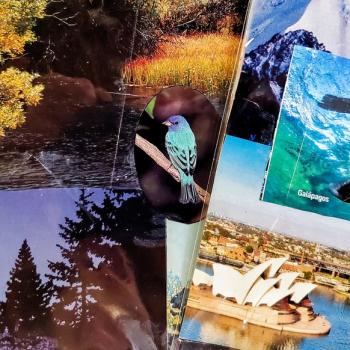 I have a story to tell. I learned this when I went in search of a story told by someone else. I thought surely someone must have told this story. Here is how it happened.
I have a story to tell. I learned this when I went in search of a story told by someone else. I thought surely someone must have told this story. Here is how it happened.
Before I came here, I served two congregations in Vermont at the same time. One of them was the Unitarian Universalist Fellowship of Bennington. When I got there, I was delighted to discover that the congregation had an annual tradition of a big Saturday night winter solstice celebration, including a multigenerational pageant. There was always, of course, a service the following morning as well. Early in my time there, I decided that we should celebrate darkness on Saturday night, and celebrate the returning light on Sunday morning, so I went in search of stories for the celebration of darkness in the evening.
Thus did I discover just how hard it is to find stories that celebrate darkness. I looked first in anthologies and collections of stories for the winter solstice from around the world. They all took this as an opportunity to celebrate the returning light. Then I looked at stories for the summer solstice, but they were also all about the gifts of light. So, I expanded my search to just any kind of story about the gifts of darkness. This found me, one afternoon in the weeks before Yule at a local bookstore looking at every single picture book in the place, hoping to find something I could use. The best I could come up with was Stellaluna, by Janell Cannon, about a bat who is raised by birds, and who is delighted to discover she can see in the dark when she is reunited with her own kind. Since that day, I have found several other excellent examples. But in that moment, I decided the stories I needed didn’t exist, and I would have to write them myself.
I have been writing stories celebrating darkness ever since, in the form of fairytales or folk tales. They are new, of course, by they tend to follow some of the conventions of traditional stories or myths. I find this folktale style works really well for me. It does not require particularly sophisticated plots or characters, but rather has an immediacy and simplicity that allows me to capture the essence of what I am trying to say. So far, I have told four versions of basically this same story, because it feels like part of my work in the world to tell this story. I have a story to tell.
You have a story to tell, too. I’m serious, you do. You in particular have a story that is yours to share with the world – at least one.
Your story might come directly out of your own life. It might be nonfiction in that sense. There might be a story of events that have actually happened to you, things your life has taught you that need sharing with the world.
Immense Power In Hearing
There is immense power in hearing the real, honest stories of other people’s lives and experiences. This is one of the reasons that the LGBTQ rights movement has accomplished so very much in such a relatively short period of time, historically speaking. Because of people telling our true individual stories, coming out, especially to those who already know and love us. Sharing our own stories deeply and honestly has allowed others to empathize and eventually to be part of enacting change. While there was also tons of more formal organizing, of course, which was also necessary for the gains this movement has already won, and remains necessary for the things we have yet to accomplish in the realm of queer liberation, I think it is fair to say that without thousands of people coming out and telling their stories, we would not have marriage equality at the national level, nor the discrimination protections that exist in many states.
This is also the understanding behind the #MeToo movement, that it takes the personal stories of women who have experienced sexual harassment and assault to understand the depth and breadth of these problems in so many corners of our society. That while one or two reports of abuse can be ignored or discounted, the sheer volume of stories that have been told in the past year has brought these issues to vivid life, and has led to the beginnings of real change.
Coming Out Stories
In addition to compelling social change, in both movements, another part of the reason for telling personal stories is to help others with similar experience feel less alone. Coming out is partly a way to help other LGBTQ people who are still feeling isolated and alone to feel a little less alone. The use of #MeToo among survivors of sexual harassment and violence was started by activist Tarana Burke, who said, “It was a catchphrase to be used from survivor to survivor to let folks know that they were not alone and that a movement for radical healing was happening and possible.”
So perhaps the story you have to tell is one like this, where the true details of your own experience can help others to feel less alone, or to create the empathy that is needed to raise up an issue of injustice in the service of creating justice. Perhaps there are just a few people who you want to tell your story to, or perhaps it is a story that needs a wider audience. Is there something in your life that you want to speak about in the world right now?
Some of the stories we need to tell are this direct and factual. There are things we learn best as human beings and human communities from the true events and experiences of others. But it is also the case that fiction can sometimes go places in our consciousness – and our subconsciousness – that true events cannot reach. This is one of the reasons we keep telling fictional stories. This is the purpose of myths, fairytales, folktales, and also the more complex works of fiction that humans have created and shared for as long as we have organized ourselves into communities and civilizations.
Creating and Sharing Your Own Fairytales
I want to invite you today to think about creating and sharing your own fairytales. Because perhaps this is the story you have to share with the world, as it is for me and my stories celebrating darkness. Perhaps there is some important insight that you can best bring to the world by sharing it in the form of a fictional story.
There are lots of ways of approaching fairytales that already exist, and this can be a useful place to start if the idea of creating a story is daunting. If the blank page is scary, start with one that already has something on it! Some of the ways to make old stories new are: reading past the ending or before the beginning of existing stories; switching up the genders of the characters, or even reimagining two characters we thought were separate as different faces of the same person; telling the story from a different perspective, like that of the traditional villain; and putting two or more stories together and seeing what emerges.
Retelling stories that are familiar is effective, because that allows people to enter and engage in a particular way, with recognition at first, and creating the surprise when you veer off the usual track that enables people to see things in a new way. So here is your invitation not just to enter into the retellings that others have created, but to do some of that retelling yourself.
Or perhaps there is a message you want to send that is best delivered with a brand new story that follows the convention of a fairytale, but with entirely new content. As my wife Rachel and I are discovering in trying to teach our values to our son, a story can be a great way of delivering ethical teachings without sounding moralistic or scolding. But I don’t think their effectiveness ends with children. I know that even very simple stories can help me think about things in a new way or call me back to my best self.
What do you really wish that others understood? How do you wish we were all acting differently, more aligned with our Principles and values? What message is yours to share with the world right now? How can you craft a story that delivers that message in a way that is inviting and compelling?
You Have A Story To Tell
You have a story to tell. At least one. It is a story that is uniquely yours to tell, and that someone needs to hear. That might be just one other person, or it might be the whole world. Your story might be the story of real events, or it might be a variation on an existing story that will help your listeners understand something new, or it might be a story that is entirely the creation of your own imagination. Once you start, you may discover that, in fact, you have many stories to tell. Or that the one story you have to tell can be told in many different ways.
I believe that it is inherently true that every person has a story that is theirs to tell, part of their work in the world. But this is perhaps especially true right now, at this time when so much is in motion, when so much is at stake, where the events of the world around us seem so poised to fall apart.
When I look around at the devastation of our world and especially at the environmental degradation and the looming threat of irreversible climate change, I sometimes wish I could have lived in a different time. Why now? Why couldn’t I have been born in a simpler time, an easier time, when the challenges facing humanity were not quite so stark and quite so bleak.
Joanna Macy’s Perspective
Ecologist and spiritual teacher Joanna Macy offers a different perspective on being alive right now. “I consider myself fortunate,” she says, “to live in these times.” In an interview with the website Ecological Buddhism, she says:
There’s such a feeling and experience of adventure. It’s like a trumpet call to a great adventure. In all great adventures there comes a time when the little band of heroes feels totally outnumbered and bleak, like Frodo in Lord of the Rings or Pilgrim in Pilgrim’s Progress. … How is the story going to end? And that seems almost orchestrated to bring forth from us the biggest moral strength, courage, and creativity. I feel because when things are this unstable, a person’s determination, how they choose to invest their energy and their heart and mind can have much more effect on the larger picture than we’re accustomed to think. So I find it a very exciting time to be alive.
She asks us to consider that perhaps we are here exactly to meet the challenges of this moment. I don’t know if that’s factually true or not, but I think it’s an idea worth trying on – that there is a reason that we in particular are here on this planet at this particular time. Because telling the story this way invites us to wonder what we have to offer at this precise moment. If we imagine that there is a purpose to our presence in the human community right now, that can be encouragement to bring out our gifts, because, after all, they are precisely what is needed and called for in these times.
Tell your story. Share your gifts with the world. You are the light. Yours are the stories. We are the people whose time it is to speak the future of love and justice into being.

















